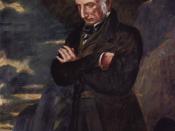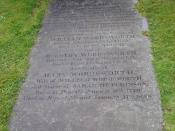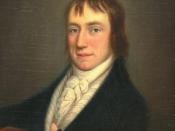William Wordsworth is widely considered one of the most influential English romantic poets. In the preface of his book, Lyrical Ballads, published in 1798, Wordsworth declared that poetry should contain language really used by men. This idea, and many of his others, challenged the old eighteenth-cuntury idea of formal poetry and, therefore, he changed the course of modern poetry (Wordsworth, William DISCovering).
Wordsworth was born in Cockermouth, England, to John, a prominent aristocrat, and Anne Wordsworth, but with his mother's death in 1778, William and his family began to drift apart. William was sent to boarding school in Hawkeshead, and his sister, Dorothy, was sent to live with cousins in Halifax. It was in the rural surroundings of Hawkeshead that William learned his appreciation for nature and the outdoors. Unfortunately, once again, the peacefulness of his life was disturbed by his father's death in 1783. William was sent from relative to relative, all of whom thought of him only as a burden.
It has been pointed out by biographers that Wordsworth's unhappy early life contrasts with the idealized portrait of childhood that he presents in his writings (Wordsworth, William DISCovering).
Wordsworth went to college at St. John's College in Cambridge and later wrote that the highlight of those years was his walking tour of France and Switzerland taken with his friend, Robert Jones (Watson 1421). He graduated in 1791 when the French revolution was in its third year, but, even though he had showed no prior interest, he quickly supported the Revolution's goals. After Wordsworth was forced to flee France he became involved with the studies of philosopher William Godwin; Godwin became one of the most inveterate influences on Wordsworth's thought ('Wordsworth, William' Compton's). In 1793 Wordsworth published his first two volumes of poetry, Descriptive Sketches and An Evening Walk.


